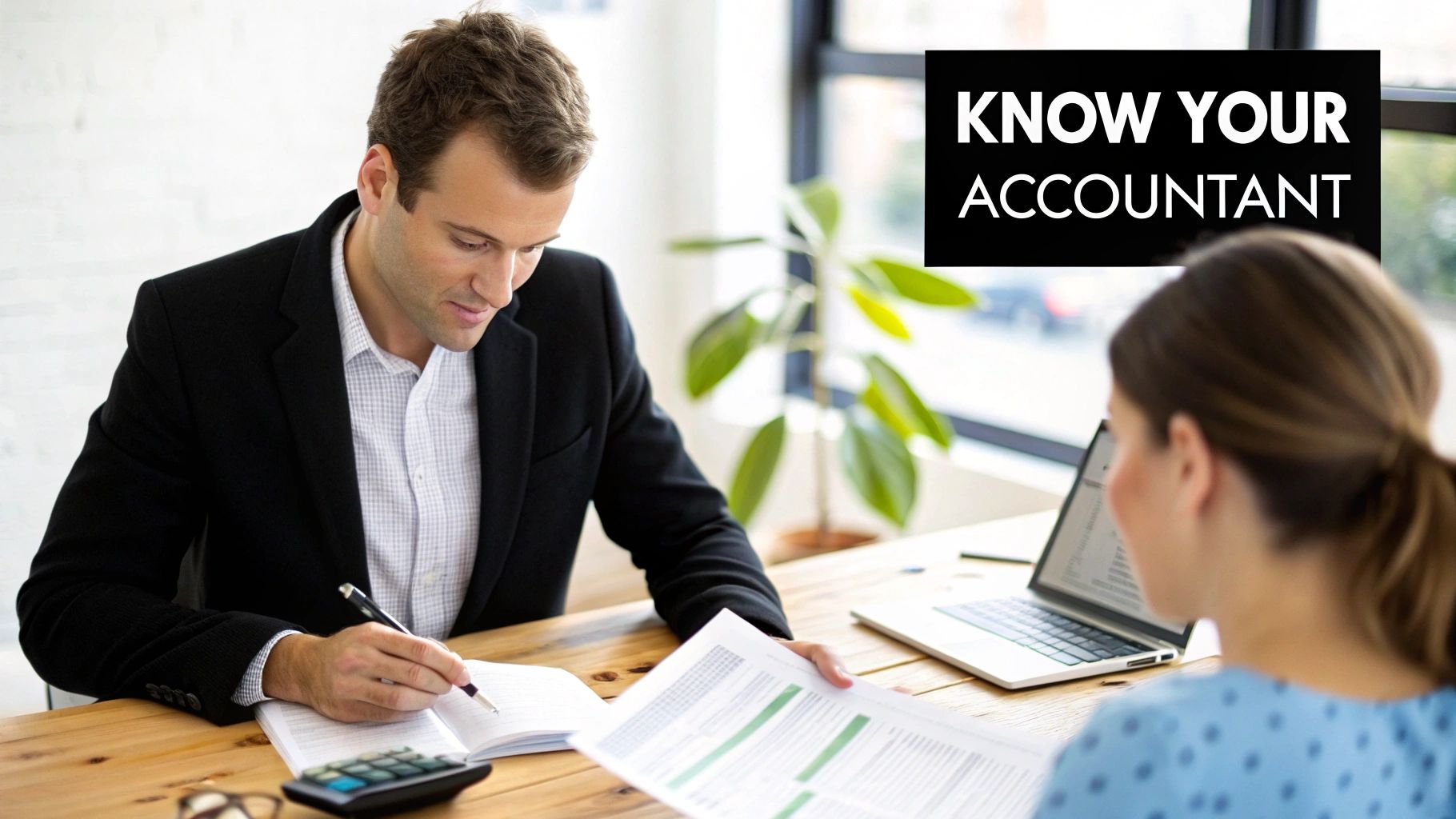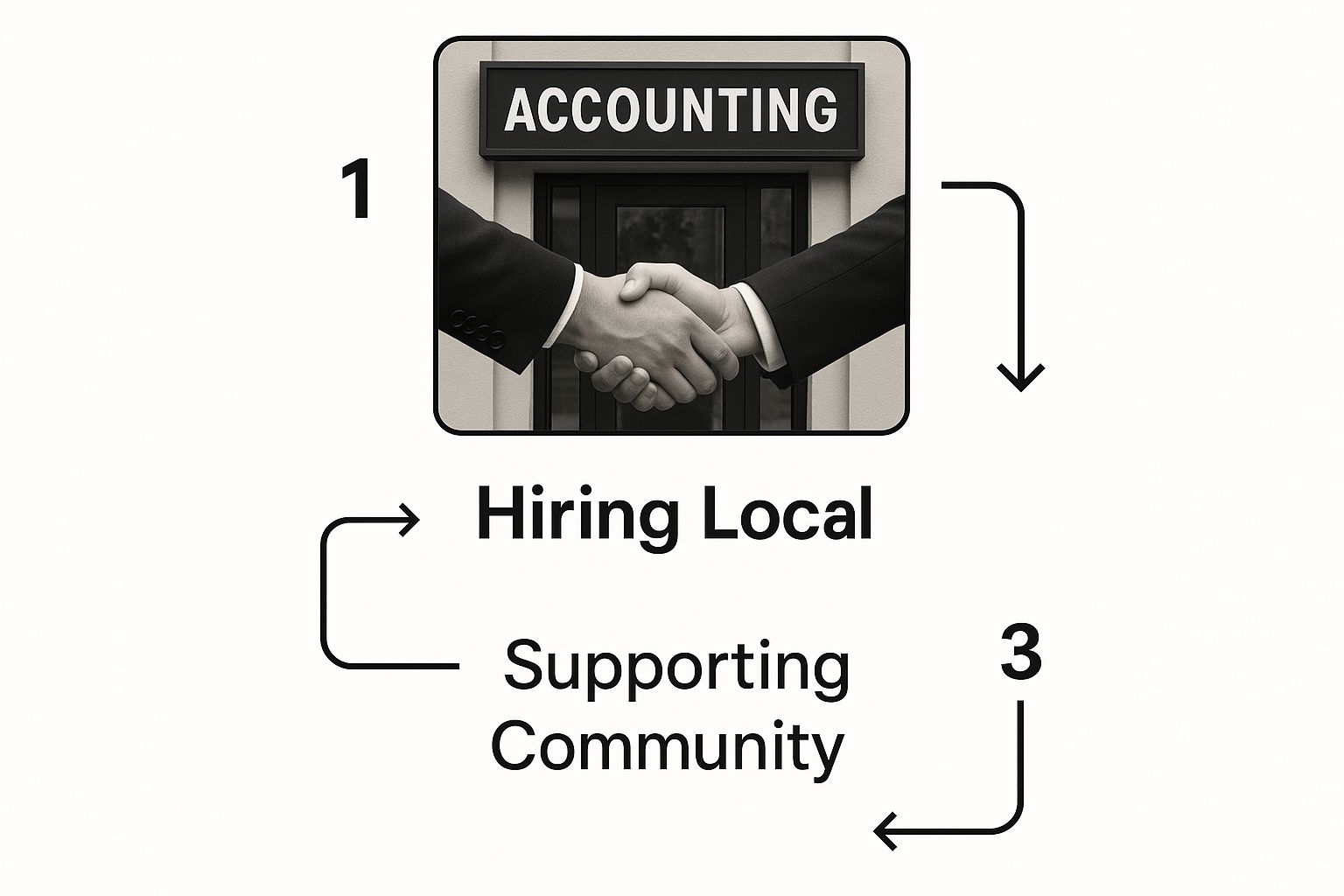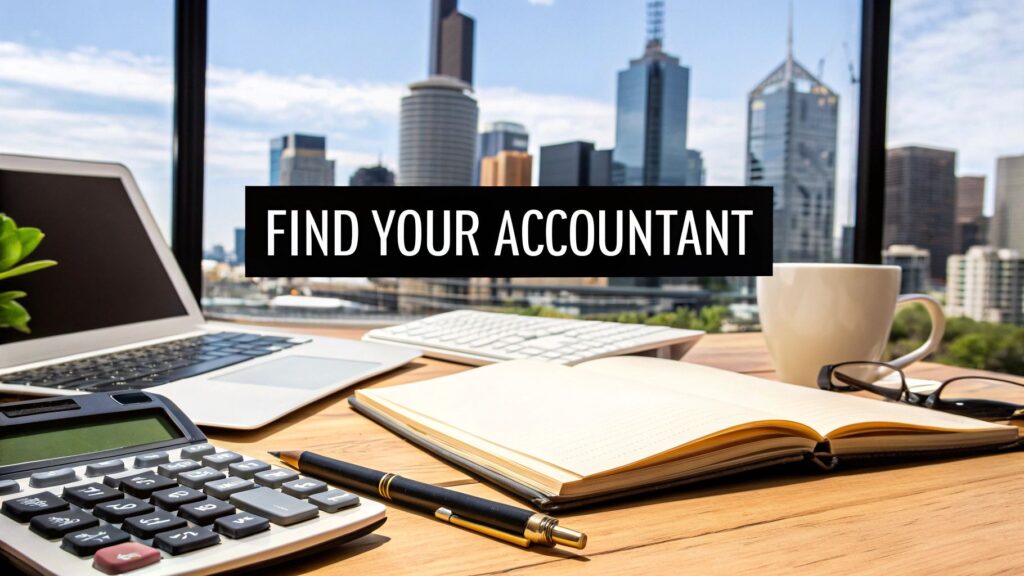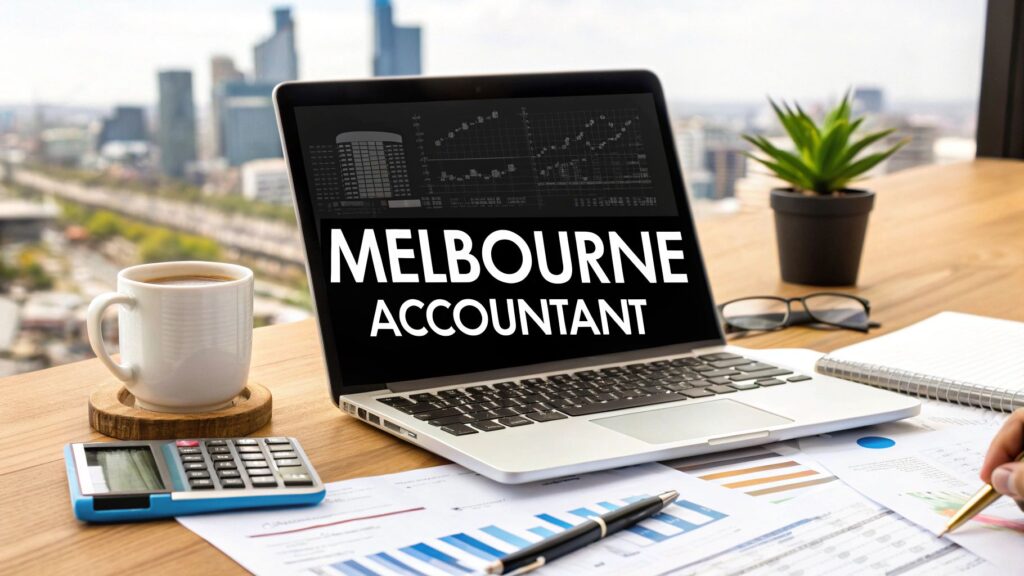Typing "tax accountant near me" into a search bar is often the first step, but it’s about so much more than just finding someone around the corner. Think of it as a strategic move for your financial future. A local professional offers a level of personalised service and an understanding of the regional economic landscape that you just can't get from a faceless online firm.
It's about having a real face-to-face partnership.
Why a Local Accountant Is Your Best Bet

Choosing an accountant is a big decision. While online services seem convenient, there’s a massive advantage to working with someone who operates in your own community. A local expert doesn’t just see your numbers on a spreadsheet; they get the story behind them.
This kind of proximity builds a stronger, more personal relationship. It turns your accountant from someone who just lodges your return once a year into a genuine financial partner who is actually invested in your success.
The Power of Local Knowledge
Your local accountant is immersed in the exact same business environment as you. They’re on top of state-specific regulations, know about local council grants, and see industry trends that a remote firm could easily miss.
Imagine getting a call about a new Victorian government incentive for small businesses, or a heads-up about a zoning change that could affect your operations. This is the kind of hyper-local insight that gives you a real competitive edge. It’s the difference between just staying compliant and being truly proactive with your finances.
The whole debate over a "tax accountant close to me vs online accountant" really boils down to this crucial point: https://genesishub.com.au/tax-accountant-close-to-me-vs-online-accountant/.
A local accountant offers more than just tax services; they provide community-centric financial intelligence. They understand the nuances of the local market, offering insights that can directly impact your bottom line.
Building a Relationship Beyond the Screen
Never underestimate the power of sitting down with someone in person. A face-to-face chat can sort out complex issues way more efficiently than a long email chain. It builds a deeper connection and a level of trust that ensures your accountant truly understands your financial goals and worries.
This relationship-driven approach is priceless, especially when you're navigating stressful periods like tax time or making major business decisions. Your local accountant becomes a trusted sounding board, someone you can rely on for clear, direct guidance when you need it most.
This need for expert advice is growing right across the country. The Australian accounting services market was valued at around USD 11.4 billion in 2024 and is expected to grow significantly, largely because of increasing regulatory complexity from bodies like the ATO. You can dig into more details on this growth over at imarcgroup.com.
How to Find the Right Local Tax Professionals
Searching for a "tax accountant near me" and picking the first result is a bit of a gamble. Finding a genuinely great one requires a smarter strategy. The best accountants are often busy serving their clients, not running huge ad campaigns, so you need to know where to look.
My approach always starts with official, reputable sources before I even think about asking for recommendations. This way, I know I'm starting with a list of qualified, registered, and properly vetted professionals. It saves a ton of time and gives you peace of mind right from the get-go.
Start with Official Registries
Your first stop should always be the professional bodies that regulate Australian tax practitioners. These online registers are the only way to be 100% certain you're dealing with someone who is legally authorised to handle your taxes. Think of it as your first quality filter.
There are two main places I always check:
- The Tax Practitioners Board (TPB) Register: This one is non-negotiable. Anyone or any company providing tax agent services for a fee in Australia must be on this register. A quick search here confirms they're legit and will also show you any disciplinary actions they might have on their record.
- CPA Australia's 'Find a CPA' Tool: If you want someone with the highly respected Certified Practising Accountant (CPA) designation, this directory is brilliant. It lets you pinpoint CPAs in your local area who are available for public practice.
Using these tools builds a solid foundation for your search. You'll have a pre-vetted shortlist of professionals who meet Australia's strict legal and ethical standards before you even look at a single website.
Leverage Your Professional and Local Networks
Official registers give you a list of names, but personal referrals give you the real story. Once you've got a few potential accountants in mind, it's time to ask around for some genuine, real-world feedback.
Don't just ask, "Who's your accountant?" Get specific to get the best recommendations.
For instance, if you're a freelance graphic designer, you'd get much better advice by asking in a local business group: "Looking for a tax accountant near me who really gets the creative industries. Who do you recommend for handling irregular income and knowing what deductions we can claim?"
A recommendation from another business owner in your industry is worth its weight in gold. They can tell you if an accountant truly understands your specific challenges, whether that's managing inventory for a retail shop or handling project-based finances for a tradie.
Reading Between the Lines of Online Reviews
Online reviews are useful, but you have to look past the star rating. I always scan for patterns in the comments rather than getting swayed by one amazing or terrible review.
The most valuable reviews are the ones that explain how the accountant solved a problem, not just that they did a good job.
For example, a review that says, "Sarah helped us restructure our business, which saved us thousands in tax and made our BAS lodgements so much simpler," tells you a lot. It shows the accountant provides strategic advice, not just basic paperwork filing. That's the kind of detail that separates a simple tax filer from a true financial partner.
Vetting Your Shortlist of Accountants
You've got a list of potential accountants. Great. Now the real work begins. This is where you dig in and find out if that "tax accountant near me" is actually the right financial partner for you and your business.
First things first, and this is non-negotiable: check their credentials.
Before you even think about calling or emailing, jump onto the Tax Practitioners Board (TPB) register. This is the official government database, and it's your single source of truth. A quick search will confirm if they are a Registered Tax Agent, which is a legal must-have for anyone in Australia providing tax services for a fee.
This simple check takes less than a minute and protects you from unqualified, unprofessional, or even downright fraudulent operators. Don't skip it.
Asking the Right Questions in Your Initial Consultation
That first meeting or call is more than just a chat about their fees. Think of it as a two-way interview. You're sizing them up, and they should be doing the same for you. To get a real feel for who they are, you need to go beyond the surface.
Instead of a generic question like, "Do you work with businesses like mine?" get specific. Try these on for size:
- "Can you walk me through your experience with businesses in the [your industry] space? What are some common pitfalls you help them avoid?"
- "Which accounting software are you most proficient with, like Xero or MYOB? More importantly, how do you help clients get the most out of it?"
- "What's your communication style like? Are you proactive with advice during the year, or do we only talk when a deadline is looming?"
These sorts of questions shift the conversation from a sales pitch to a genuine discussion. You'll quickly get a sense of whether they're just a number-cruncher or someone who's actively invested in their clients' financial success.
A great accountant won't just answer your questions; they'll ask you thoughtful ones in return. They should be curious about your business, your goals for the future, and your biggest financial pain points.
This whole process is about finding a true partner, someone who can help build a strong financial foundation for your business.

This handshake is what it's all about. You're not just hiring a service; you're starting a professional partnership built on trust and a shared goal—your success.
To keep your evaluation on track, I've put together a quick checklist. Use this as a guide when you're doing your research and during that initial chat.
Accountant Vetting Checklist
| Verification Point | What to Check | Why It's Important |
|---|---|---|
| Credentials | Is the accountant a Registered Tax Agent on the TPB register? | This is a legal requirement. It ensures they meet minimum qualification and ethical standards. |
| Industry Experience | Have they worked with businesses in your specific industry before? | Niche expertise means they understand your unique challenges, opportunities, and relevant deductions. |
| Tech Proficiency | Are they skilled with your accounting software (e.g., Xero, MYOB, QuickBooks)? | This ensures seamless collaboration and efficient bookkeeping, saving you time and headaches. |
| Communication Style | Do they communicate clearly? Are they proactive or reactive? | You need an advisor who explains complex topics simply and keeps you informed throughout the year. |
| Fee Structure | Is their pricing transparent? Do they offer fixed-fee packages or charge by the hour? | Clear pricing avoids surprise bills and helps you budget effectively for their services. |
| Proactive Advice | Do they talk about tax planning and business strategy, not just lodging returns? | A great accountant helps you plan for the future, not just report on the past. This is where the real value is. |
This checklist isn't exhaustive, but it covers the core areas that separate an average accountant from a great one. It's about finding someone who ticks all the right boxes for your specific situation.
Gauging Their Understanding of Your Specific Needs
No two businesses are the same. A cookie-cutter approach to accounting just doesn't cut it. Your mission is to find an accountant who gets the unique financial world you operate in.
A tradie needs an accountant who understands contractor payments, vehicle expenses, and tool depreciation inside and out. An e-commerce store owner, on the other hand, needs an expert in GST on international sales, inventory valuation, and payment gateway fees.
During your meeting, give them a real-world scenario to chew on. You could ask something like, "We're thinking about bringing on our first employee in the next six months. What are the key things we need to get right from a tax and payroll perspective?"
Their answer will tell you everything you need to know. It will instantly reveal whether they can provide the kind of strategic, practical, and truly tailored advice that will make a difference to your business.
Moving From Tax Filer to Strategic Partner
Let's be honest, most people start searching for a "tax accountant near me" with one simple goal: get the taxes lodged on time and without any drama. But the best accountants offer so much more than just ticking the compliance boxes. The real game-changer is finding an advisor who acts like a strategic partner in your business, someone who's actively working to improve your financial position long before any ATO deadlines are even on the radar.
This is a huge mental shift. Instead of seeing your accountant as the person who just cleans up last year's financial mess, you need to view them as a key player in mapping out your future. They stop being a historian of your finances and become an architect for a more profitable future.
What Proactive Advice Actually Looks Like
So, what does this "strategic partnership" look like in the real world? It’s all about getting proactive guidance that delivers real results, turning what feels like complex financial jargon into clear, simple steps you can actually take.
A proactive accountant might suggest things like:
- Smarter Business Structuring: An accountant can analyse whether being a sole trader, company, or trust is the most suitable structure for you now and advise on changes as you grow.
- Cash Flow Forecasting: They won't just look at past bank statements. A good accountant can help you build a model to predict your cash flow, spotting potential dry spells before they hit and helping you plan for big expenses or investments.
- Long-Term Financial Planning: This goes way beyond this year's tax return. This could involve discussions around succession planning, building business value for an eventual sale, and setting you up for the future you want.
The difference is simple yet profound. A tax filer reacts to what has already happened. A strategic partner anticipates what's coming and helps you prepare for it, creating opportunities rather than just dealing with obligations.
This shift from basic compliance to high-level advisory is a massive trend in the Australian accounting industry. By 2025, the sector's revenue is expected to hit a staggering AUD 33.4 billion, and that growth isn't just from lodging tax returns—it's driven by these exact kinds of strategic services.
How to Spot a True Financial Partner
The trick is to find someone who's as invested in your business's growth as you are. A genuine partner is curious. They ask questions about your goals, your challenges, and your five-year plan. They don't just process your BAS; they analyse it to find opportunities and flag risks you might not have even thought of.
If you're still on the fence, have a look at our guide on the top 5 reasons small businesses should work with a tax accountant close to me. Finding this kind of professional transforms your accounting bill from a necessary evil into one of the best investments you can make in your business.
Preparing for Your First Accountant Meeting

You only get one chance to make a first impression, and this initial meeting sets the stage for what could be a long and fruitful professional relationship. Coming prepared isn't just about looking organised; it's about giving a potential accountant a clear, honest picture of your financial world.
This allows them to offer meaningful advice from day one, rather than speaking in generalities. It also helps you accurately gauge if this is the right "tax accountant near me" to help you hit your goals.
Gathering Your Essential Documents
Walking into that first chat empty-handed is a recipe for a wasted hour. To get real value, you need to provide a snapshot of your financial history and where you stand today. A good accountant can scan these documents and immediately start spotting opportunities, potential red flags, and the best way forward.
Before you head out the door, make sure you've pulled together:
- Past Tax Returns: Bringing at least the last two years of returns, for both your business and personal filings, gives them crucial context.
- Business Financial Statements: Your Profit & Loss statement, Balance Sheet, and cash flow statements for the last financial year are important documents to have.
- Business Registration Details: Have your ABN, ACN, and any other key registration details handy.
Having these documents ready makes for a much more productive, specific conversation. For a deeper dive into getting your records in order, check out our guide on how small business owners can navigate tax season.
Clarifying Goals and Expectations
This meeting is about much more than just numbers. A successful partnership is built on clear communication and making sure you’re both on the same page. This is your chance to lay out exactly what you're looking for and to understand how they work.
Don't be shy here. Define what a great working relationship looks like to you.
The most critical part of this meeting isn’t discussing last year's tax bill; it’s about defining your financial future. Be ready to talk about your business goals, growth plans, and biggest financial worries.
Think about your communication style. Do you prefer a quick monthly check-in call, or are quarterly email updates enough? Sorting this out now prevents mismatched expectations down the track and ensures you get the proactive advice you need, when you need it.
Finally, they'll likely present you with an engagement letter. This isn't just a formality—it's your contract. It outlines the scope of work, the specific services they'll provide, their fee structure, and the responsibilities for both of you. Read it carefully. A transparent, trustworthy partnership starts with making sure there are no surprises here.
Got Questions? Let's Clear a Few Things Up
Even after doing your homework, a few practical questions always seem to pop up. Searching for a "tax accountant near me" often brings up worries about cost, whether you really need one, and what all the professional titles actually mean.
Let's tackle these common queries head-on so you can move forward with confidence.
Just a heads-up: this is general info to help you make a smart decision, not official tax advice.
How Much Does a Tax Accountant Cost in Australia?
There's no single price tag, unfortunately. The cost really hinges on how complex your finances are, where you're located, and the accountant's experience level.
For a pretty straightforward individual tax return, you could be looking at a few hundred dollars. Many people find the investment worthwhile, as a sharp accountant can often identify deductions that might otherwise be missed.
If you're running a small business, the costs naturally climb. Services like lodging your Business Activity Statement (BAS), handling bookkeeping, and preparing year-end financials can run from a few hundred to over a thousand dollars each quarter. A lot of modern firms now offer fixed-fee monthly packages, which are brilliant for budgeting and avoiding those dreaded surprise invoices.
Before you agree to anything, always ask for a detailed engagement letter. This is non-negotiable. It should spell out exactly what services they'll provide and what it will cost, ensuring you’re both on the same page from day one.
Do I Really Need an Accountant for a "Simple" Return?
Look, if your financial world is truly simple—we're talking one job, no investments, no side hustles—then it may be possible to manage it yourself using the ATO's myTax platform.
But the word "simple" can be a bit of a trap.
The second you throw in things like capital gains from selling shares, income from a rental property, or any earnings as a sole trader, the game changes. That’s when professional help becomes incredibly valuable. An accountant isn't just about lodging the forms; they're about helping you comply with the latest tax laws and navigate your potential deductions. It’s about financial peace of mind.
What’s the Difference Between a Tax Agent and an Accountant?
This one trips a lot of people up, but it's a crucial distinction.
An accountant is a professional trained to manage and interpret financial records. They understand the numbers. However, not just any accountant is legally allowed to prepare and lodge a tax return for someone else.
For that, they need to be a Registered Tax Agent. This is an official registration with the Tax Practitioners Board (TPB), and it’s a legal must-have for anyone in Australia providing tax services for a fee.
While most accountants you'd find in public practice are also registered tax agents, it never hurts to double-check. You can quickly verify their status on the TPB register to be certain they’re authorised to handle your tax affairs.
Ready to partner with a proactive Melbourne accounting firm that simplifies your finances and strengthens your business? The team at Genesis Hub offers clear, hands-on support for small businesses and sole traders. Book your free initial consultation with Genesis Hub today.





